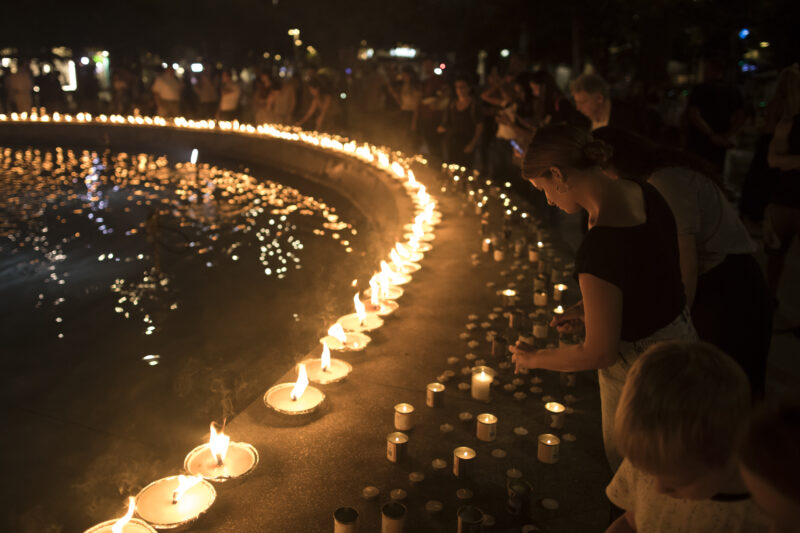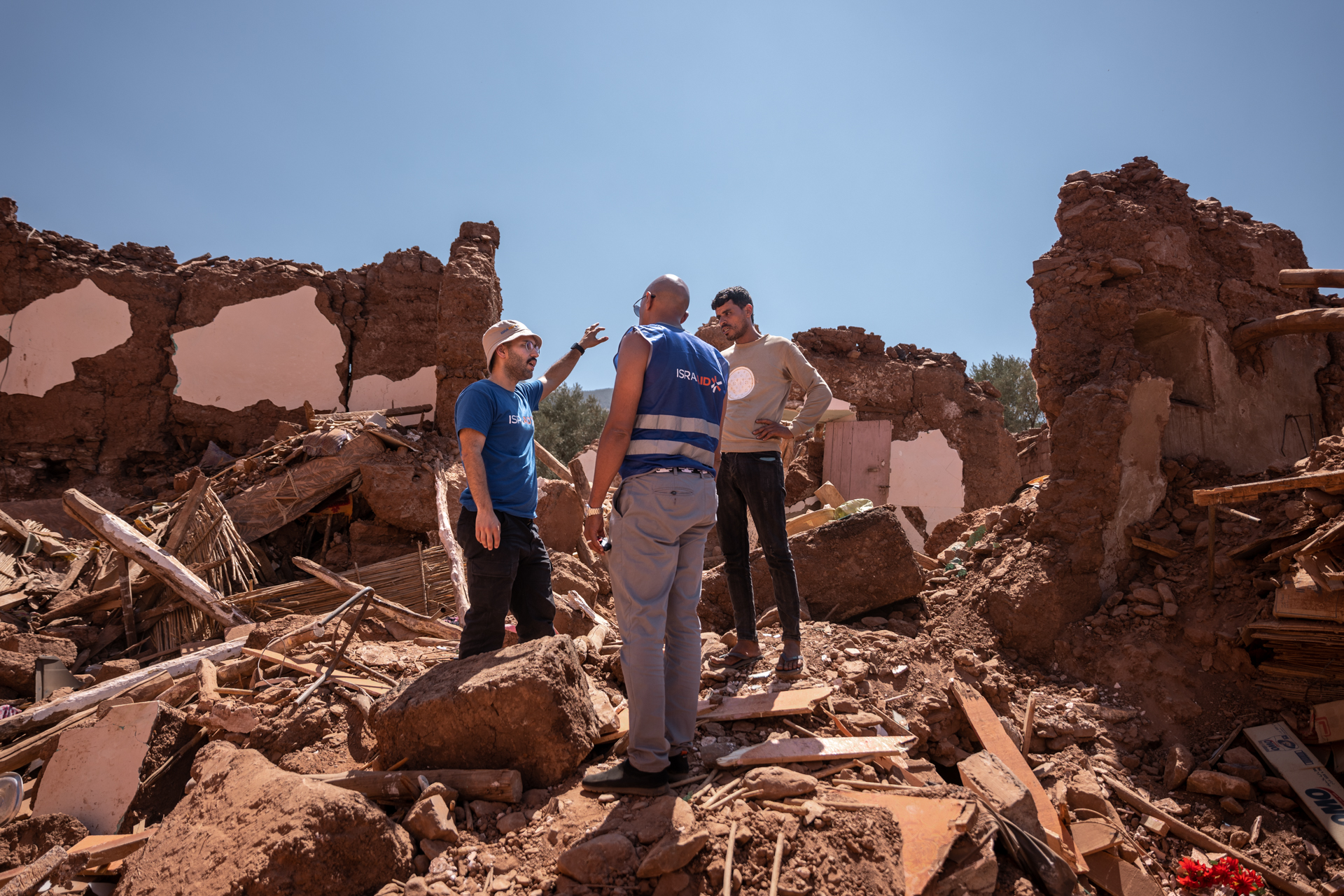United for the Jewish State: Koret grantees supporting Israel and Jews worldwide
United for the Jewish State: Koret grantees supporting Israel and Jews worldwide
Chapters:
We remain horrified and saddened by the Hamas attacks of October 7 in Israel, which are unlike any we have ever seen before. We are devastated—but unfortunately not surprised—by the rising tide of antisemitism that has followed.
So many Israelis have shown and continue to show such courage and determination in support of their countrymen, and their resilience and solidarity gives us hope. Israel is fighting not just for the country’s right to exist, but also for the Jewish community worldwide.
We are honored to support the grantees below, and to highlight the ways they are leveraging their unique expertise and resources to respond during Israel’s time of greatest need.
Am Yisrael Chai.
IsraAID: Responding to an emergency on the homefront
IsraAID — Israel’s largest humanitarian aid organization — has over 20 years of experience providing emergency relief to countries around the globe experiencing crises. Now, their expertise is needed at home. In the aftermath of October 7, IsraAID quickly mobilized teams to offer a full range of support services at a hotel near the Dead Sea. One focus is psycho-social support for displaced families and emergency workers. This includes setting up schools and child-friendly spaces to give children a safe place to play, process, and “just be kids” amid the upheaval, and distributing resilience kits with stress-relief activities for children and families.
Most recently, IsraAID has begun delivering and installing temporary protective spaces for unrecognized Bedouin villages. Bedouin communities are unrecognized villages in southern Israel that are primarily home to Arab-Israeli citizens. Most of these communities—collectively home to about 150,000 people—lack access to bomb shelters, exposing them to additional danger from ongoing rocket fire. Government bans on building permanent structures further complicate efforts to provide necessary protection from rocket and missile fire. The temporary shelters will offer a degree of protection for communities in these villages, which otherwise would not have access to shelter from ongoing missile fire. As the war continues and new needs arise, IsraAID will continue to work with local communities to meet needs. Learn more.
JCRC: Mobilizing the Bay Area
The Jewish Community Relations Council (JCRC) is the largest collective voice of the Jewish community across the Bay Area. Showing support for Israel and combating antisemitism are, even more than usually, the organization’s highest priorities. JCRC understands that the existence and protection of Israel and its people are paramount to Jewish peoplehood worldwide, and it is deploying its resources towards advocacy, support, and community building.
JCRC’s most visible solidarity activities include organizing events, vigils, and gatherings. Their grassroots mobilization includes crafting petitions that advocate for U.S. support of Israel and calling out antisemitism in local and state governments and educational institutions. JCRC also develops and compiles existing resources for parents, educators, and employers on how to talk to and support individuals during this time; and sharing other resources like helplines and mental health services. Visit its comprehensive list of resources and find out what actions you can take. Learn more.
USC Shoah Foundation: Recording survivor testimonies
USC Shoah Foundation was originally created to record and gather testimonies of Holocaust survivors and subsequent genocides in countries like Cambodia and Rwanda. In the past year the organization decided to begin taking testimonies on contemporary antisemitism. Then, October 7 happened. Within days, teams from the Shoah Foundation were on the ground in Israel taping testimonies of the survivors.
Collecting the testimonies from survivors of the massacres in Israeli towns near the Gaza border and at the Tribe of Nova festival will both preserve these personal accounts for later study and provide a platform for the voices of survivors to echo for future generations. The Shoah Foundation will return to every subject further down the line, maybe years down the line, to find out how each survivor’s journey of healing has progressed. Learn more.
Tel Aviv University: Supporting students and volunteering
The number one priority for Tel Aviv University (TAU) is ensuring the safety and well-being of its students. Immediately after the attack, TAU set up psychological hotlines in both Hebrew and English, and sent out emergency grants for every student called up to reserve duty. In November, all reservist-students received a second grant.
TAU has expanded its supports beyond the student body, to share all its available resources, which are diverse. These include providing temporary housing in the dorms for evacuees, sending DNA specialists to help identify victims, offering free dental first aid, fighting fake news in social media, and holding major drives for food, clothing, and medical supplies.
Students at the university have also jumped at opportunities to volunteer for projects supporting soldiers and Israeli citizens alike, including helping patients at hospitals, providing legal support for individuals trying to access public services, and making food for soldiers. One of the largest volunteer activities is a program that has sent about 800 students, faculty, and staff to farms near the Israeli-Gaza border to provide much-needed assistance in agricultural work. Three times a week a busload of about 40 TAU volunteers arrives at the farm that needs it most to salvage the harvest or help sow a new one. Learn more about the incredible work the TAU community is doing.
Lev Echad: Activating community volunteers
Lev Echad — Hebrew for “one heart” — is a community crisis aid organization that was established to create a network of volunteers that can be deployed in a professional and organized manner during a state of emergency. The goal of Lev Echad is to empower its network of volunteers to help their neighbors “in their own way” in their own communities. When there is no crisis, Lev Echad is a skeleton organization with just a few members. But in an emergency, Lev Echad activates its network of volunteers to go into their communities and help provide basic necessities to those in need.
Since the Hamas attacks, Lev Echad is operating at full capacity, with tens of thousands of active volunteers in Israel. The majority of volunteers are helping families of soldiers, hostages, and victims of the war with physical, emotional, and logistical needs. These range from daily tasks like groceries and house maintenance, to accessing government services and mental health supports.
Lev Echad believes that national resilience is measured by civil activism in rough times, true leadership grows from the bottom-up, and reciprocal social responsibility is Israeli society’s first line of defense. To learn more, donate, or become a volunteer, visit their website.
Shalom Hartman Institute: Navigating grief and war
The Shalom Hartman Institute (SHI) is the leading center of Jewish thought and education serving Israel and North America. Immediately after the attacks on October 7th, SHI began publishing content to help both Israeli and North American Jews cope with the horrific events and navigate this new normal. Online content includes a special podcast series to help parents and educators navigate complex conversations with young people about war, a virtual event exploring what the Torah can teach us about prioritizing how we help and what our responsibilities are during this time, and much more.
On the ground, SHI has mobilized its network of spiritual leaders by sending Rabbinical delegations, from both North America and Israel, to communities throughout Israel devastated by the October 7 attacks. These spiritual leaders are providing direct spiritual, pastoral, and psychosocial support to hundreds of evacuees from Southern and Northern Israel, and are working to bring communities together, encourage people to listen to one another, and start the healing process. Learn more and access their vast library of content here.
ANU Museum: Preserving Jewish identity
The effects of this war have already touched every institution in Israel deeply and personally, and hundreds of thousands of Israelis have been called from IDF reserves. Many ANU team members or their immediate family members are on the front lines or otherwise deployed, leaving behind spouses, children, and other family members. To help, ANU is providing emergency support to its team members and their units and helping their families by assessing needs and responding to them as quickly as it can.
As Jews worldwide struggle with antisemitism, ANU is also offering free online resources for Jewish educators and professionals on global Jewish resilience, which helps people learn how to preserve their Jewish identity and sense of purpose during crises in Jewish history.
ANU is also leading a “Bring Them Home” video projection campaign that solicits the participation of organizations with outdoor spaces and buildings worldwide to project photos of the hostages. The video projections include pictures of the missing Israelis along with artists’ works reflecting displacement, discrimination, and distress. Access the free resources and video projection files and learn more.
Shalem College: Providing relief for student-reservists
The day after the October 7 attacks, staff, students, and alumni at Shalem College set up a command center to help with immediate war needs. They reached out to all students called up for reserve duty to check on their well-being. From these conversations, they ascertained what the reservists needed and worked to obtain and deliver items ranging from socks and rain gear to tactical knives and helmets.
Soon after, Shalem joined forces with the recently conceived Jerusalem Operations Center—Chamal Yerushalmi—where hundreds of volunteers in more than a dozen call centers were fielding non-stop requests from soldiers, displaced citizens, families of reserve soldiers, and citizens in need of a range of services. Departments included housing, transportation, tactical equipment, trauma and psychological services, and a rabbinic operation. The Jerusalem Operations Center was able to meet many soldiers’ needs through donated equipment and supplies, but it had no mechanism for raising funds in Israel or abroad and no revenue to purchase additional supplies and address evolving needs.
Under the banner of the jointly run Operation Iron Swords Relief Effort, Shalem has helped raise nearly $4 million, enabling the fully-volunteer entity to provide more than 25,000 hot meals to soldiers; distribute more than 20,000 boxes of urgent supplies; house displaced Israelies in over 60 hotels; and provide daycare and psychological services to more than 20,000 children. Learn more.




